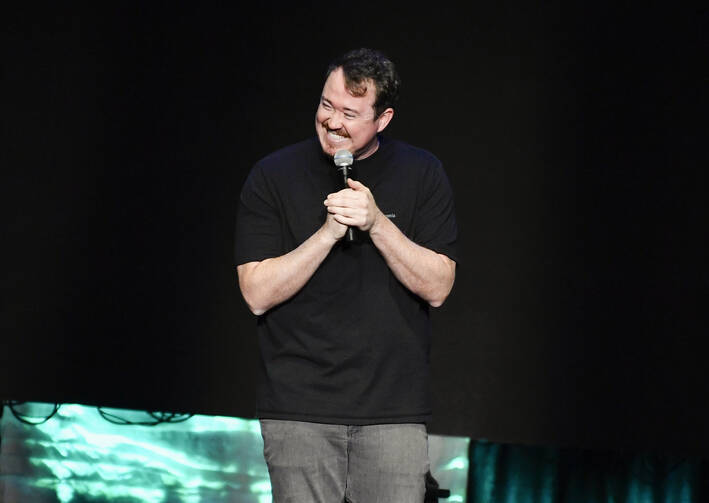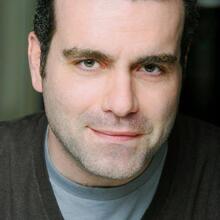Shane Gillis does not make a good first impression. He looks and sounds like every online scold’s worst nightmare: an out-of-shape, white, millennial male, casually throwing around offensive words that most people have not heard outside of a middle school playground since 1987. And yet…there is something more there. And while it might be difficult to stick around for that something more that Shane Gillis has to say, I would advise you to do so. It is worth the anticipatory discomfort.
Gillis’s rise is very much a product of the twenty-first century, as his audience has not been solely cultivated at stand-up clubs or on late-night talk shows. Rather, he found his footing as a comic in the sphere of new technology: he and fellow jokester Matt McCusker’s podcast “Shane and Matt’s Secret” first brought him to prominence and was then followed by a YouTube channel, as well as other media platforms.
He appears to be every on-line scold's worst nightmare: an out-of-shape, white, millennial male, casually throwing around offensive words.
He gained notoriety early in his career for a joke about how former President Trump would be the funniest president to watch get assassinated. In one YouTube skit, Gillis portrays a golfer giving a shame-faced press conference in which he confesses to the world that he is not the low-life womanizer he is reputed to be. (“Womanizer” is a euphemism miles away from the crude phrase the golfer uses.) Instead of all the strip clubs and affairs that supposedly marked up his evenings, the golfer tells us, he was usually just practicing his swing.
Gillis’s first Netflix special, “Beautiful Dogs,” dropped last fall.
It could be said that Gillis is not for everyone, but in a sense, he actually is. Like all great comedians, Shane Gillis has something important to say. The problem (for you, dear reader, and not for him) is that you do not immediately realize that he has something substantive to say, because you are also squirming so much. Gillis’s comedy is a hybrid of cringe humor and “bro” culture; however, both wind up being subordinated to the fiercely intelligent observational skills that ultimately steer his comedic course.
Like all great comedians, Shane Gillis has something important to say, even if you are squirming so much.
When I speak of cringe humor, I am referring to a brand of comedy that arose to a place of prominence during the first decade of this century. This was due in no small part to the proliferation of single-camera TV series featuring an unreflective, self-absorbed protagonist seemingly oblivious to their lack of intelligence and social skills.
“The Office’s” Michael Scott as portrayed by Steve Carrell is one of the most prominent examples, alongside Sasha Baron Cohen’s Ali G from the show of the same name. Amy Poehler’s character Leslie Knope on “Parks and Recreation” provides a gentler variation on the cringe.
Gillis takes the cringe, as it were, a step further. Because he is a real, live person saying these awkward things, we lose the fictive element of a sitcom that can serve as a buffer for the audience; a buffer, namely, between amused discomfort and total revulsion that the audience feels in response to the offensive statement made by the fictional protagonist. Instead, within the presumed “real-life” context of the stand-up form, Gillis presents seemingly no protection from the, at times, unbearable awkwardness that his unpoliced comments evoke.
Cringe humor usually involves an unreflective, self-absorbed protagonist seemingly oblivious to their lack of intelligence and social skills.
In one routine, he points out that the University of Alabama football team desegregated in 1971 only after it got beat by a team of Black players from the University of Southern California. Gillis goes on to suggest that if only “the transgenders” would put together a great football team, they would earn instant approval in the South.
Gillis’s on-stage persona embodies the millennial “bro.” This is a broad categorization for young, white males, usually distinguished by their enjoyment of domestic beer and televised sports, being carelessly misogynistic and lacking intellectual curiosity. Watching Gillis’s stand-up act, it appears as if he is from another time. And by that, I mean it is as though he was transported from the 1980s to the present day, somehow bypassing the advent and subsequent entrenchment of language policing within mainstream cultural discourse.
This is not to say that there is necessarily any virtue in Gillis’ use of certain casually offensive terms. Rather, it speaks to his unwavering commitment to an on-stage persona to which this sort of rhetoric is affixed. It also serves his overarching three-fold comedic agenda: to make his audience cringe, laugh and reflect, but not necessarily in that order.
Gillis appears to have bypassed the advent and subsequent entrenchment of language policing within mainstream cultural discourse.
In a way, Gillis’ comedy discloses the diversionary nature of the censoriousness that runs throughout much of contemporary Western culture; that is, the preoccupation with condemning rhetorical minutiae at the expense of legitimate social action. Indeed, the comedian found himself on the wrong side of the law of public opinion in 2019, after being let go as a cast member from “Saturday Night Live” days after being hired. A podcast featuring Gillis making racial slurs against Asians came to light and soon after Lorne Michaels issued a statement saying Gillis’s services would no longer be needed by NBC’s landmark comedy institution.
This is not to defend Gillis’s comments. It is rather to demonstrate that Gillis is clearly aware of the repercussions that his humor can have, particularly when it veers into the realm of the misguided. In other words, he has already suffered the consequences of his comedic approach. With that said, when done well, Gillis’s comedy demonstrates how frequently we as an audience can miss the proverbial forest through the trees, in this day and age of the forensic parsing of public speech.
Gillis highlights our preoccupation with condemning rhetorical minutiae at the expense of legitimate social action.
Upon first viewing, it is very easy to be put off by Gillis and his seemingly irreverent, insular, “dude” persona. But if you are only paying attention to the cosmetics of the act, the posturing and the rhetoric, you will miss the incredibly intelligent man and his incredibly astute commentary on contemporary society. Yes, it always starts from the place of a white, male perspective, but it is, upon further investigation, a very reflective, self-aware and intelligent mode of social commentary.
Gillis’s recent Netflix special “Beautiful Dogs” is a testament to his comedic aims. Utilizing his on-stage persona, Gillis performs the very deft comedic sleight of hand of appearing to be fully invested in the “bro” universe while simultaneously critiquing and attempting to transcend it.
Upon further investigation, his comedy is a very reflective, self-aware and intelligent mode of social commentary.
In the show, Gillis gives an account of his tour of Mount Vernon, the home of President George Washington, during the first summer of Covid in 2020. It also coincided with the cultural moment that Gillis refers to as “tearing down statue season,” when the United States underwent a flurry of removing monuments of historical figures with dubious ethical legacies.
When the audience at his show responds to Gillis’s perceived “out of character” historical curiosity in a Founding Father’s slave quarters, with bemused chuckles, Gillis shoots back, “What did you guys do that summer? F—ing post black squares on your Instagram?” In reminding the audience of this phenomenon some two years after the fact, he exposes the sometimes absurd ineffectuality of keyboard activism.
Gillis gives an account of his entirely silent (due to Covid precautions, no one was allowed to speak indoors), and totally surreal hour-long tour of Mount Vernon given by an actor portraying our nation’s first First Lady, Martha Washington. Gillis not only goes on a tour of the estate’s actual slave quarters, but is also given a chance to converse with an actor portraying one of the former president’s slaves. As it goes on, it becomes clear that this anecdote perhaps does more to demythologize the nation’s first president than any protest or treatise ever could.
Gillis’s segment on his family members who have Down’s Syndrome, particularly his Uncle Danny, is quite poignant, but in a Shane Gillis way. He claims that you can always tell the people who have never been around someone with Down Syndrome because they always respond “like Down Syndrome is the end of the f—ing world.” And when they invariably ask “Are they doing okay?” Gillis responds, “They’re doing better than everyone I know. They're the only dudes I know having a good time pretty consistently. Sorry, they’re not on Adderall and anti-anxieties like the rest of us. They’re on Capri Suns having a good time.”
Watching a Gillis show requires some work. He does not hand anything to you. He continually makes you evaluate what exactly he is doing up there and question whether or not you should be laughing. Gillis makes an intelligent audience work for their laughs. He is continually pushing buttons, single-mindedly refusing to relent in his pursuit of demonstrating the paradoxical reality of living in the United States right now. Simultaneously, he is attempting to shape some meaning out of it all while pulling a few laughs in the process.








